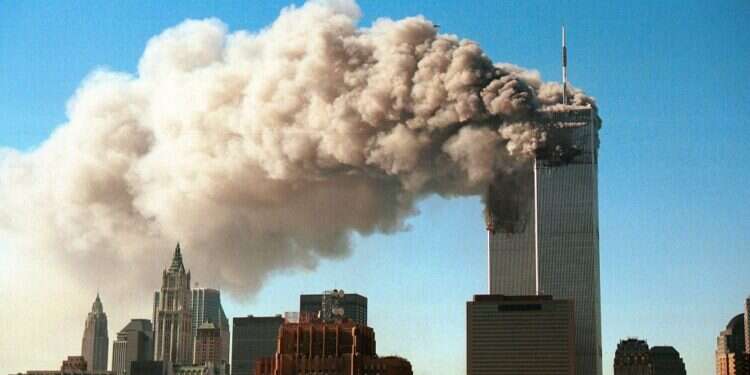
23 Years after Twin Towers Disaster, Danger of Taliban Terrorism Is More Serious Than Ever
(Israel) on 11 September 2024
by David Zevuloni (link to original)
Twenty-three years have passed since 9/11 when the whole world held its breath in the face of the horrific spectacle of the two tallest building in the United States collapsing like a house of cards. Some 2,977 people were murdered in the attack and we know the rest of the story — the United States declared war on al-Qaida, assassinated the organization’s leader, Osama bin Laden, invaded Afghanistan, overthrew Taliban rule, and fought on the ground against local terrorism for 20 years.
And then? Then the Biden administration decided there was no longer any need for this war. The president ordered the military to withdraw and left the door open with the keys on the table. The Taliban came back to life as if it had never been defeated and retook control of the region. More precisely, the Americans left Afghanistan on Aug. 30, 2021, while Afghan President Ashraf Ghani had already fled the country on Aug. 15 seeking refuge, first in Tajikistan and then Uzbekistan. Kabul, with a population of almost 4.5 million, fell to the Taliban within hours.
What has happened in the last three years since the United States withdrew from Afghanistan that has allowed extremist leadership to amass so much power without any opposition? How is it that the long war was unable to defeat the terrorist organization once and for all? Is the entire free world in danger again, al-Qaida and the Taliban having joined together and sworn allegiance to each other? Twenty-three years after the catastrophe, these questions are still painful for the United States, while the debate over the U.S. military withdrawal is alive and kicking.
The primary thing to remember is that the Taliban regime was almost completely defeated in October 2001 when thousands of American soldiers arrived in Afghanistan with the goal of ousting al-Qaida and the government accused of protecting the terrorists. Taliban leaders were forced to flee Afghanistan and most of them found refuge in neighboring Pakistan, where they were able to reorganize. At the same time, the United States launched a war in Iraq to topple Saddam Hussein’s regime and diverted resources meant to deal with the Taliban. Thus, America’s defeat in the region began.
The Taliban organization returned to fighting in a major way. It successfully recruited new fighters even during the most turbulent periods of the conflict. The organization became an unofficial government in certain regions of Afghanistan, performing a number of state functions in a country that was revealed to be too weak and corrupt to manage the entire nation. Thus, the Taliban accumulated power, status and legitimacy until it succeeded in persuading the United States that it was better to withdraw without any prearranged agreement than to remain. It was an unofficial failure, albeit a failure in every sense of the word.
Despite harsh criticism, President Joe Biden declared he did not regret his decision to withdraw forces from Afghanistan. He claimed that Washington had nothing more to gain there and, speaking as the fourth American president to have soldiers on the ground there, said he did not intend to leave the war for the next president. “American troops cannot and should not be fighting in a war and dying in a war that Afghan forces are not willing to fight for themselves,” Biden concluded. Former president and current presidential candidate Donald Trump, who as president signed an agreement to withdraw from Afghanistan, accused his Democratic rival of being weak. “When I was in power, the Taliban knew that the campaign of conquests like this that it is conducting would not pass quietly on the part of the United States,” he stressed.*
Discussion about withdrawing from Afghanistan is still central to the American agenda. Did the United States make a mistake when it declared war on the terrorist organization at the beginning? Did it make a mistake perhaps in how it conducted the battle? In general, did it err in deciding to withdraw from territory it had invaded at a bloody cost? And most of all, did the Western presence in the Middle East contribute to fighting terrorism or did it only cause terrorism to raise its head, make it stronger, more belligerent, and more cruel? Apparently the answer to all these questions has been deferred until the event finds its place in history.
In the meantime, the facts on the ground remain unchanged: The same terrorists who murdered innocent Americans 23 years ago are again threatening American lives. Afghanistan today looks the same way it looked two decades ago and there are those who say the situation now is even worse. Just a week ago, Taliban leaders published a 114-page set of new and unprecedented laws. Moreover, extremist Arab states are imposing impossible restrictions on their populations.
Today, the whole world fears that Afghanistan will again become a hothouse for jihad, a habitat for some of the most dangerous terrorists in the Middle East. And that’s not all. There is great concern that a wave of refugees will flee the Islamic State and flood Europe. When this happens, if this happens, it will already be too late to blame the American administration. Regardless, the whole world, apparently, will be at war.
*Editor’s note: Although accurately translated, these quoted remarks by Donald Trump could not be independently verified.

